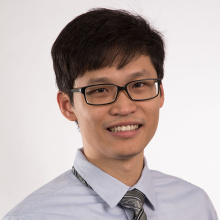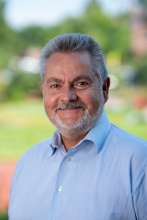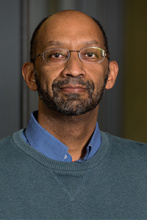CPS Events
Byzantine Resilience in Large Robot Swarms
Abstract
Multi-robot systems have many appealing applications such as shape formation, search and rescue, surveillance and reconnaissance, cooperative target tracking, and collective transport. However, even the presence of a few faulty or malicious robots can easily disrupt the overall function and safety of the swarm. In this talk, I will present a novel method for achieving Byzantine resilience in large robot swarms. We consider Byzantine robots which are an unknown subset of robots that are allowed to have arbitrarily different behaviors relative to the cooperative robots in terms of physical actions and communication. I will show that by leveraging the cyber-physical characteristics of the robots, we can design a decentralized blocklist protocol (DBP) based on inter-robot accusations to guarantee the removal of Byzantine robots' influence on the swarm. Compared with the state-of-the-art Weighted-Mean Subsequence Reduced (W-MSR) algorithm, DBP can generalize to applications not implemented via the Linear Consensus Protocol, can automatically adapt to the (unknown) number of Byzantine robots, and reduces the connectivity requirement of W-MSR from (2F+1)-connected to (F+1)-connected (where F is the number of Byzantine robots). I will demonstrate that DBP scales to swarms with hundreds of robots across a set of tasks including target tracking, time synchronization, and localization. I will conclude the talk by giving an overview of related research endeavors in my group, particularly those that aim at verifying and enhancing the robustness of A.I. and A.I.-enabled systems, and discuss future directions.
Bio
Wenchao Li is an Assistant Professor in the Department of Electrical and Computer Engineering and directs the Dependable Computing Laboratory at Boston University. Prior to joining BU, he was a Computer Scientist at SRI International, Menlo Park. He received his Ph.D. in Electrical Engineering and Computer Sciences from the University of California, Berkeley in 2013. His research sits at the intersection of formal methods and machine learning, with a focus on building safe and trustworthy autonomous systems.
Motion planning for Multi-Agent Systems with Signal Temporal Logic objectives
Abstract
Safe planning and control of multi-robot performing complex tasks has been a challenging problem. Methods that offer guarantees on safety and mission satisfaction generally do not scale well. On the other hand, more computationally tractable approaches do not offer much in terms of safety guarantees. In this talk, I will present a family of robust and predictive motion planning and control methods that overcome these limitations for a wide variety of task objectives, represented using Signal Temporal Logic (STL). Starting from the given STL specification, we formulate a non-convex optimization problem, which can be efficiently solved to local optimality in both centralized and decentralized manners. We also formulate constraints which result in trajectories that can be tracked near perfectly by off-the-shelf lower level controllers. The performance and scalability of the methods will be demonstrated through multi-robot simulation studies and experiments on actual quadrotor aerial robots.
Bio
Dr. Yash Vardhan Pant is an Assistant Professor in the Department of Electrical and Computer Engineering at the University of Waterloo, where he leads the Control, Learning and Logic (CL2) group. He received his PhD in Electrical Engineering from the University of Pennsylvania in 2019, and was a postdoctoral fellow at the University of California at Berkeley from 2019-2021, before joining Waterloo in the summer of 2021. His research focuses on decision-making for multi-agent and autonomous systems, drawing on elements of Control Theory, Machine Learning, Formal Methods and Optimization, with application to ground robots, human-robot interaction and swarms of aerial robots. More details about Dr. Pant’s research can be found at: https://yashpant.github.io/
Modeling and Navigation Controller Design of a Circulation Control Fixed-Wing UAV
Abstract
Circulation Control (CC) is an effective technique that allows for increasing lift and improving aerodynamic efficiency of Unmanned Aerial Vehicles (UAVs). CC-based UAVs exhibit enhanced aerodynamic performance in terms of reduced runway for take-off and landing, increased effective payload capability and delayed stall. However, CC introduces changes of the aerodynamic coefficients that are difficult to determine using strict mathematical formulas. It creates a specific type of model uncertainty in the CC-based fixed-wing Unmanned Aerial Vehicle (UC²AV), which must be addressed and accommodated for; this is tackled using µ- analysis. A detailed systematic approach to parameter identification of the UC²AV is first required to derive an accurate model, before designing a navigation controller. Then, a novel, robust nonlinear controller for the longitudinal / lateral flight dynamics of a UC²AV is presented. The controller consists of a dynamic inversion inner-loop and a µ-synthesis outer-loop controller. Results demonstrate the efficacy of the proposed control scheme and the ability of the UC²AV to adapt to challenging CC-on-demand scenarios. The proposed controller design may be generalized and applied to a family of nonlinear systems with unstructured uncertainties and time-varying parameters, going beyond addressing uncertainty challenges regarding the aircraft’s aerodynamic coefficients. Last, but not least, a detailed mathematical framework is presented that serves as ‘benchmark’ for UAV linear and nonlinear controller design, implementation and testing under nominal and extreme conditions.
Bio
Dr. Kimon P. Valavanis is John Evans Professor, Department of ECE, D. F. Ritchie School of Engineering and Computer Science, University of Denver. He is also Guest Professor in the Faculty of Electrical Engineering and Computing, University of Zagreb, Croatia, and he also had a Visiting Appointment at Politecnico di Torino, Dipartimento di Ingegneria Meccanica e Aerospaziale, DIMEAS. His research interests span Unmanned Systems, Distributed Intelligence Systems, Robotics and Automation. He has published more than 450 book chapters, technical journal, and transaction, referred conference, and invited papers. He has authored/co-authored/edited 19 books. He has graduated 38 PhD students and more than 100 M.Sc. students.
Dr. Valavanis served as Editor-in-Chief of the Robotics and Automation Magazine from 1996-2005, and since 2006, of the Journal of Intelligent and Robotic Systems, Springer. He also serves as co-chair of the Aerial Robotics and Unmanned Aerial Vehicles Technical Committee since 2008. He founded the International Conference on Unmanned Aircraft Systems, which he runs annually.
Dr. Valavanis was a Distinguished Speaker in the IEEE Robotics and Automation Society, a Senior Member of IEEE, a Fellow of the American Association for the Advancement of Science, a Fellow of the U.K. Institute of Measurement and Control, and a Technical Expert of the NATO Science and Technology Organization (STO). He was also selected to serve as NATO Technical Evaluator for the AVT-353 Workshop on ‘Artificial Intelligence in the Cockpit for UAVs’ that will take place in Torino, Italy, in April 2022. In August of 2021, he was also appointed to the NATO STO Technical Team of SAS-ET-EX on “Integration of Unmanned Systems into Operational Units” for the duration of the Program of Work. He is also a Fulbright Scholar (Senior Lecturing & Research Award).
Designing State Estimators for Safety-Critical Aerospace Positioning, Navigation and Timing Systems
Abstract
The integration of digital connectivity with physical processes in IoT environments has enabled sensors and actuators to interact with each other over the physical space. However, IoT environments have complex physical interactions between actuators and sensors that create new classes of vulnerabilities. Unfortunately, traditional IoT security measures ignore such complex physical interactions and fail to achieve sufficient breadth and fidelity to uncover these vulnerabilities, causing poor accuracy and false alarms.
We discuss an approach that is used in the design of state estimators used in safety-critical positioning, navigation, and timing systems used for aerospace applications. A key requirement in the design of these estimator is being able to demonstrate that they satisfy stringent safety standards established by certification authorities. While these standards are normally performance requirements given in stochastic terms, proving compliance with them requires a combination of analytical and experimental approaches. This presentation will discuss the challenges associated with designing these estimators. The tradeoff between safety and performance will be described and discussed in detail. As a case study, we will describe a synthetic air data estimator designed as a backup for the traditional pitot-static systems used in an Unmanned Aerial Vehicle (UAV). In closing, we describe some of the open research question associated with the application of sensing and state estimation to the design of safety-critical avionics.
Bio
Demoz Gebre-Egziabher is a professor in the Department of Aerospace Engineering and Mechanics at the University of Minnesota, Twin Cities. At the University of Minnesota, he teaches courses in aerospace systems and directs a research lab focusing on the design of multi-sensor navigation and attitude determination systems for aerospace vehicles. He is the current director of the NASA/Minnesota Space Grant Consortium. He is a Fellow of the Institute of Navigation (ION) and an associate fellow of the American Institute of Aeronautics and Astronautics (AIAA). From 1990 to 1996 he was an officer in the United States Navy where he served as a system engineer on the staff of the Naval Sea Systems Command division of naval reactors in Washington D.C. Dr. Gebre-Egziabher holds a B.S in Aerospace Engineering from the University of Arizona, a M.S in Mechanical Engineering from the George Washington University and a Ph.D. in aeronautics and astronautics from Stanford University. He is a registered professional engineer (mechanical engineering)
Compositional Safety and Security Reasoning in IoT Environments
Abstract
The integration of digital connectivity with physical processes in IoT environments has enabled sensors and actuators to interact with each other over the physical space. However, IoT environments have complex physical interactions between actuators and sensors that create new classes of vulnerabilities. Unfortunately, traditional IoT security measures ignore such complex physical interactions and fail to achieve sufficient breadth and fidelity to uncover these vulnerabilities, causing poor accuracy and false alarms.
In this talk, I will discuss our efforts in safety and security reasoning in IoT deployments through physical modeling and formal analysis. First, I will introduce our approach to discovering physical interaction vulnerabilities in IoT deployments. Our approach builds the joint physical behavior of interacting IoT apps through code and dynamic analysis. It next validates a set of new metric temporal logic policies through falsification. Second, I will demonstrate how attackers can evade existing IoT defenses by exploiting complex physical relations between actuators and sensors. I will next introduce software patching and sensor placement to make the existing defenses robust against evasion attacks. Through these efforts, we create holistic physical models toward achieving the compositional safety and security of an IoT system.
Bio
Muslum Ozgur Ozmen is currently pursuing a Ph.D. degree in the Department of Computer Science at Purdue University, where he is advised by Professor Z. Berkay Celik. Prior to joining Purdue, Ozgur earned his Master of Science degree in computer science from Oregon State University, USA, and his Bachelor‘s degree in electrical and electronics engineering from Bilkent University, Turkey. His research interests broadly lie in the area of systems security. Through systems design and formal verification, his research seeks to improve security and privacy guarantees in emerging computing platforms. His research approach is best illustrated by his work in IoT safety and security. He expects to earn his Ph.D. in the Spring of 2024. More information can be obtained at https://ozgurozmen.github.io/.






